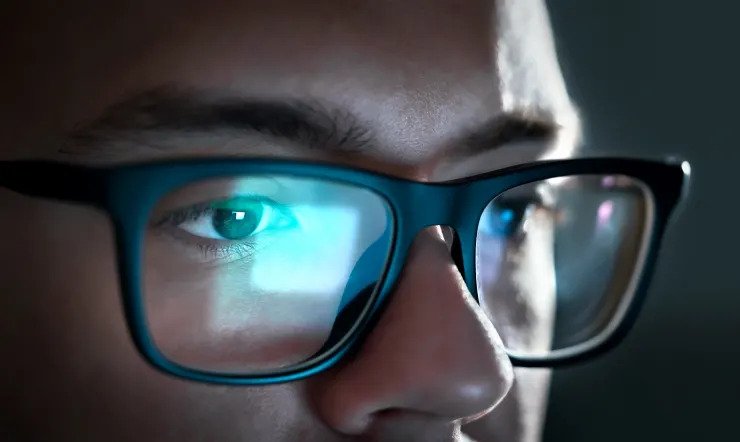

 Photo: Tero Vesalainen (Shutterstock)
Photo: Tero Vesalainen (Shutterstock)
–

We spend a lot of time staring at screens. There’s the small screen in our pocket, the big screen we watch our shows on, and the medium screen that many of us stare into for eight hours a day to help pay for those other screens. Are all of these screens ruining our eyes?
Eyestrain is real
Looking at screens for too long can cause eyestrain, but eyestrain existed long before screens. (Driving long distances is another cause, the Mayo Clinic notes.) Eyestrain may involve fatigue of the tiny muscles in and around our eyes, and people who get eyestrain may experience discomfort that includes headaches, blurry vision, watering of the eyes, and sensitivity to light.
Eyestrain from looking at screens is called digital eyestrain, or sometimes “computer vision syndrome.” Eyestrain can be caused or exacerbated by other vision problems, like farsightedness or an astigmatism that hasn’t been corrected. In those cases, getting proper treatment (like glasses) may help.
Eyestrain is often temporary, and will get better if you look away from the computer screen every now and then as you work. But if you experience eyestrain often or if it seems to be getting worse, see an optometrist so you can fix any underlying problems.
Blue light from screens isn’t ruining your eyes
There’s a rumor that the blue light from smartphones (or other screens) can ruin your vision, perhaps even leading to blindness, but it’s not backed up by evidence. “The amount of light coming from a computer has never been demonstrated to cause any eye disease,” the American Academy of Opththalmology states in an article on their website recommending against blue-light-blocking glasses.
–
There is research that finds blue light can damage cells in certain lab conditions, but those conditions are very different from what happens in the actual cells of our retina. We dug into this myth here, noting that the AAO has emphasized that—in their words—“[b]lue light from electronic screens is not making you blind.”
Unfortunately, there are companies citing research like this to sell their blue-light-blocking glasses or screen overlays, but they aren’t selling a solution to a real problem.
Blue light may affect your health and your sleep, but blue light isn’t just about screens
Blue light from screens has gained a bad reputation for interfering with sleep, but remember your rainbow facts from grade school: blue light is just one part of white light. You get plenty of blue light from the sun, for example.
Blue light-blocking filters also don’t block very much blue light; they just reduce it a tiny bit. (Experts have pointed out that you could get the same effect by holding your screen one inch farther away from your face.) Avoiding screens at bedtime is probably a good idea, but not because there’s anything especially damaging about the screens themselves.
–
How to take care of your eyes when you’re looking at screens
When you’re spending time in front of screens—any kind—the rule of thumb for eye health is the “20-20-20” rule. Every 20 minutes, take a 20-second break to look at something 20 feet away. This could mean looking down a hallway or through a window, or you could go for extra credit and get up and take a short walk outdoors. Giving your eyes a variety of things to focus on breaks up the monotony that can cause eyestrain.
We also tend to blink less when looking at something for a long time, so if your eyes feel dry when you look at a screen all day, use some eyedrops. (Look for the ones labeled “artificial tears.”)
And don’t forget to take care of your eyes outdoors, as well. Ultraviolet light from the sun can damage your eyes over the long term, so wear sunglasses that are labeled as offering “100% UV” or “UV400” protection, or that indicate they protect against UVA and UVB. A hat can also help. The effects of blue light are still being researched, but we know that UV light increases your risk of cataracts and other eye conditions. So make sure you’re taking care of your eyes all the time, not just when you’re in front of a screen.
–










DISCUSSION
You can also change the “Night Light” setting in Windows 10, no special glasses needed. There’s an option to set it automatically when you want to start winding down for bedtime.
–